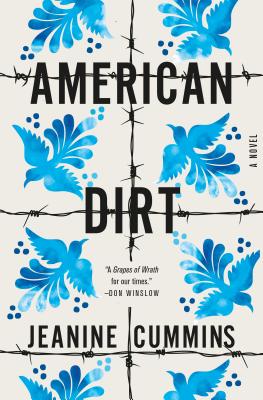The Dirt on American Dirt

When a novelist identifies as white until she writes a book about Mexican migrants in order to give a face to the “faceless brown mass” at the border, trouble follows, dirt is raised, caca is thrown. And for good reason.
The January 21 release of the much-hyped novel American Dirt, which garnered its author Jeanine Cummins a seven-figure contract, has been preceded by rave reviews in major publications. These have been countered with reviews by writers of color and an ongoing Twitter conversation robust with wrath about whose stories and whose voices are elevated by the publishing world.
In case you haven’t heard about this book blurbed by Stephen King and compared to Steinbeck’s Grapes of Wrath by another endorser, here’s a quick, breathless synopsis of its content, which I gleaned from reviews:
A middle class Mexican woman in Acapulco runs a bookstore whose customers include a cartel boss being investigated by the woman’s journalist husband, and in an act of murderous retribution, gunmen attack the family home during a quinceañera celebration, killing all but the woman and her nine-year-old son because, as luck would have it, while the rest of the family was outside enjoying barbecue, the boy was inside peeing and his mother was standing at the door at his request, so now with the cartel in hot pursuit of them, the mother and her son set off on a grueling journey north to the border to seek asylum, encountering on their way either first-hand or as frightened observers hunger, thirst, assault, robbery, and dangerous transport atop the migrant train La Bestia – all the perils that real migrants face in real life.
I’d seen the book on all those “most anticipated books of 2020” lists, but I didn’t pay much attention to it until early this month when I came across Chicana writer Myriam Gurba’s tweet about what happened to her review of the book. Asked by Ms. Magazine for her take on Cummins’s book, Gurba provided just that in her unrelentingly honest, full-bodied prose, describing American Dirt as a “literary licuado (smoothie) that tastes like its title,” pointing out its clichés, stereotypes, and shallow understanding of Mexican culture, and summing it up as “a perfect read for your local self-righteous gringa book club.”
Gurba does not pull punches in situations in which punches must be punched. She is unsparing in her well-founded disdain and masterful in her delivery of it. Ms. never published the review, paying Gurba a kill fee since she couldn’t write something “redeeming” about the book.
So Gurba wrote an essay with the irresistible and pointed title “Pendeja, You Ain’t Steinbeck: My Bronca with Fake-Ass Social Justice Literature,” in which she not only includes the review killed by Ms. but expands on it in language powerful with the Spanglish and curse words that are part of the poetry and soul of her writing.
I won’t quote from the essay here. Better to read for yourself Gurba’s eloquent takedown of Cummins’s “obra de caca,” on the Tropics of Meta blog.
In the meantime, flattering reviews proliferate by high-profile writers in high-profile publications. Lauren Groff’s rather waffling, both-sides review appeared in the New York Times and Pam Houston’s more emphatically favorable review ran in the Los Angeles Times. Both acknowledge Gurba’s opinion of the book, but also make sure to reference endorsements by Latinx literary icons Sandra Cisneros and Julia Alvarez.
New York Times critic Parul Seghal, noting that American Dirt had been on the Times’s list of most anticipated 2020 books, departs from the “rapturous and demented praise” and “takes one for the team,” presumably the community of writers of color. Seghal calls out the simplistic language and predictable plot, noting that a book can’t exist on intention alone, especially when that intention is to give a face to the “faceless brown mass” at the border. In his review, Chicano writer David Bowles calls such an intention “harmful, appropriating, inaccurate, trauma-porn melodrama.”
In an attempt to address the controversy, the Los Angeles Times published an article basically summarizing both sides of the question of who has the right to tell certain stories. The author Dorany Pineda ends the article with Colson Whitehead’s advice: “You can write about anything. Just don’t fuck it up.”
By many accounts, Cummins, a white woman with a Puerto Rican grandmother, fucked it up. And by “many accounts,” I mean many brown-faced accounts.
The publishing industry increased the fuckery by rewarding Cummins with a seven-figure contract. Seattle writer Jen Soriano justly tweeted that Cummins should donate some of that windfall to immigration rights groups.
But the most important takeaway of the Pineda article is in the middle, a quote from Gurba. “We’re perfectly competent and perfectly capable of telling stories” but “gatekeepers do not allow us inside, but they will let in somebody who wants to usurp our voice.”
Voices like Cummins’s are elevated and rewarded with fat contracts because a white publishing industry catering to white readers, anoints through its white lens a novel that is, in the publisher’s words, “IT in capital letters.” High-profile white writers are invited to review it for high-profile publications, and the (white) snowball gains momentum, while brown writers are sidelined, their words ignored.
If Gurba had written a migrant novel and it had been submitted alongside American Dirt, all things being equal (which they’re not since Gurba is the superior writer), whose manuscript likely would have been chosen for the seven-figure deal? Consider the gatekeepers, when you answer.
Cummins reads at Ravenna Third Place Books on Feb. 1. Go or don’t go. Read the book or don’t. Just be aware of the issues that the anointing of America Dirt raises by reading Gurba’s essay.
I won’t be reading Cummins’s book. But I will be reading more of Myriam Gurba’s work. She’s the author of several books, the latest of which is her memoir Mean. Jill Soloway says of Gurba, “She’s ready to wake up the world.”